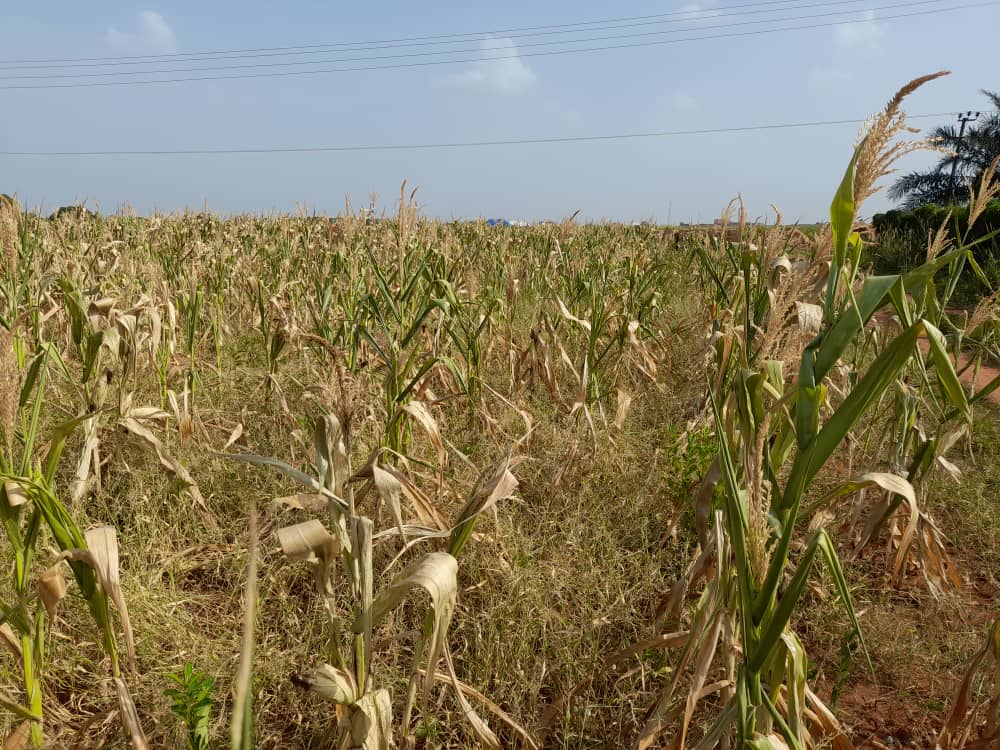Agriculture Minister Bryan Acheampong has attributed the ongoing drought crisis in the country to climate change, stressing that the core issue is not irrigation but the shifting weather patterns.
Speaking to Joy News’ PM Express Business Edition, he said the Ghana Meteorological Agency had alerted government that the planting season had shifted by an entire month, a critical change that was not effectively communicated to farmers.
“This shift in the planting season, which is a fundamental change caused by climate change, disrupted our agricultural planning,” Acheampong stated.
Read also: Four ideas that can help Ghana preserve food security when next drought hits
“We invested heavily in inputs, training, land development, seeds, and fertilizers, but with this change, all our efforts were compromised.”
The Abetifi MP acknowledged that while climate change itself cannot be prevented, measures must be put in place to protect Ghana’s food systems.

He noted that irrigation is one such measure, allowing for year-round farming independent of rainfall.
However, Mr Acheampong clarified that developing irrigation systems requires significant investment and is vastly different from the small earth dams built under the government’s "One District, One Dam" initiative.
The Minister highlighted government's efforts in expanding irrigation projects across the country, mentioning ongoing projects in areas like the Afram Plains, Tono, and Upper West regions, where 19 small irrigation projects are underway.
Read also: Government rolls out emergency measures to protect farmers and avert food crisis
Bryan Acheampong also noted that there are 15 projects ongoing in the Northern Region, aimed at creating small earth dams or dugouts to capture rainwater for agricultural and livestock use.
He stressed that these dams, designed to hold rainwater during the rainy season, have largely been successful in serving their intended purposes, such as providing water for household use, livestock, and small-scale farming.
"We must always measure an initiative against its intended purpose," Mr Acheampong said, defending the effectiveness of the projects despite criticisms of their scale and scope.
He concluded that while the government is committed to expanding irrigation, addressing the broader impacts of climate change on agriculture remains a pressing challenge that requires comprehensive planning and continuous adaptation.

Emergency measures to protect farmers and avert food crisis
Government has announced a series of interventions aimed at mitigating the impact of the ongoing dry spell on Ghanaian farmers.
On Monday, the Agric Minister detailed government's plan to provide financial support to the most vulnerable farmers, alongside food grants to ensure they meet their basic nutritional needs.
"Government has decided to provide financial support amounting to GH¢1,000 per hectare to the most vulnerable among these farmers as partial cover for their investment losses," Mr Acheampong stated.
Government's comprehensive response includes a temporary ban on grain exports, purchasing stock directly from farmers, and providing grains and poultry feed, cash transfers, food grants, input support, and technical assistance for soil moisture conservation.
Latest Stories
-
NPP Abanga blames his twin brother in NDC for his misfortune
37 minutes -
NPP Abanga breaks ranks to shield NDC twin brother in ‘galamsey’ accusations
3 hours -
Saminu Abdul Rasheed smashes national record again with 9.84s sprint in Georgia
4 hours -
Blekusu Coastal project: We’re reclaiming our coastlines – Housing Minister
6 hours -
Pricey plantains push Ghana’s market sellers to diversify
6 hours -
Full list: NPP delegates approve 54 reform motions, reject proposals on youth age, election supervision
7 hours -
WAFCON 2024: Cynthia made it easy – Chantelle hails goalkeeper after penalty saves
7 hours -
Cyber Security Authority boss suspended over use of military bodyguard
7 hours -
WAFCON 2024: I want to make history – Grace Asantewaa dreams of lifting the trophy
7 hours -
Afenyo-Markin accuses NDC of rebranding and claiming credit for NPP projects
7 hours -
2024 WAFCON: Grace Asantewa shines as Black Queens reach semis
7 hours -
WAFCON 2024: Ghana beat Algeria 4-2 on penalties to book semi-final spot for the first time since 2016
7 hours -
NPP Delegates reject motion to shift polling station selection oversight to regional committees
8 hours -
2024 WAFCON: Black Queens set up semifinal clash with hosts Morocco
8 hours -
Dr. Amuasi champions healthy sustainable socio-ecological systems thinking in Lancet One Health Commission Report
8 hours

